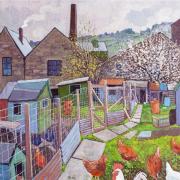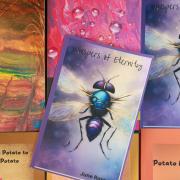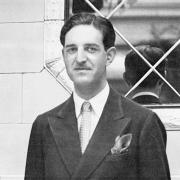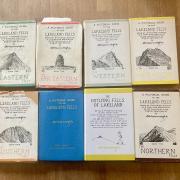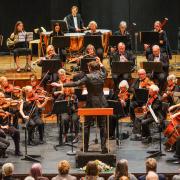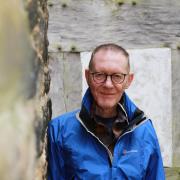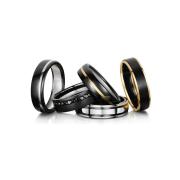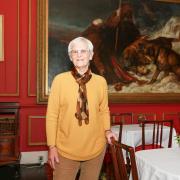Our exclusive guide to the rich and famous in Lancashire and the Lakes
The economic downturn has not sapped the energy or the spending power of our business pace-setters, writes wealth expert Philip Beresford.
The economic uncertainty hanging like a rain cloud over Europe has failed to cast a shadow over the fortunes of dynamic men and women running major businesses in Lancashire and the Lakes.
That is one of the conclusion from this year’s Glitz List, produced exclusively for Lancashire Life.
The Duke of Westminster, proud owner of the Abbeystead estate in the Trough of Bowland and the increasingly successful Liverpool One shopping centre, sits as the top of our 30 richest from across the region.
Together our top 30 are now worth nearly �17.5 billion, up sharply on last year’s total of �14.7 billion.
It was the Duke who last year pushed the wealth total upwards sharply. This year it is a combination of success for celebrities such as newly married Sir Paul McCartney and local entrepreneurs like the Arora brothers and Tom Morris who run thriving bargain retail chains.
But while we may cast envious eyes over their wealth running into hundreds of millions of pounds, we should not forget that they are huge job creators locally. Tom Morris’s Home Bargains chain may have given his family a �620m fortune, but it has also seen employment rise by over 43% in one year to nearly 7,000. With the public sector shedding jobs fast, the continuing financial health of such large private employers is critical if the north west is to have some general prosperity in future.
Retailing, property and financial services are where the fortunes are made today. There are remaining traditional industrialists with huge factories churning out goods for the world markets.
Instead, we have their modern day cousins such as entrepreneur Peter Schofield, who runs Bury-based Tetrosyl, Europe’s largest manufacturer of car care products or Iqbal Ahmed, whose Manchester-based Seamark Group is a leading processor of seafood. These are the sort of companies that are vital to rebalance the British economy and carry us through the lean times. All power to their owners for taking them through the current economic storms.
Lancashire’s old aristocrats and landowners, aside from Westminster, just do not have the acres or art to make it to our top 30. And while we can get the remaining Beatles in, they really represent the old generation of rockers. No younger stars have made enough to break into our ranks.
And while the north west is filled with rich football stars, their wealth is not enough to make it into our league table.
The Duke of WestminsterProperty�7,350m
Staff from the Abbeystead Estate, near Lancaster, rubbed shoulders with royalty at a glitzy 21st birthday party organised by the Duke of Westminster for his son and heir in February. Fifty-three employees from the Duke’s 23,500-acre estate, along with their wives, husbands and partners joined guests including Prince Harry in celebrating Hugh, Earl Grosvenor’s landmark. On their arrival at Eaton Hall, the Duke’s family home near Chester, they were greeted by a driveway lit by torches and candles and a green laser light shot into the sky from an obelisk.
The Duke could also be forgiven for celebrating the success of his whole Grosvenor Group. The property giant controlled by his family trusts, has �3.2 billion of future developments in the pipeline. Strong demand for central London property continues unabated. Westminster also showed his ambition to grow his business by appointing a Goldman Sachs veteran to head the Grosvenor Fund Management arm, which manages �3.6 billion of property assets.
One success story has been in Lancashire with the Liverpool One shopping centre. At the time, the group wrote off �165m on its value and it was seen as a white elephant. But the centre is full and winning international awards. The property business controlled by Westminster dates back to 1677 when Sir Thomas Grosvenor married Mary Davies and what was then 500 acres of swamp. Today that forms the heart of the Mayfair estate - the heart of the Grosvenor family fortune.
The shares are owned by the trustees of various Grosvenor trusts set up for the benefit of the family, which is now headed by the 6th Duke, who stood down as chairman of the board in 2007, although he has remained chairman of the trustees. The net asset value of the Grosvenor Group rose in 2011 to nearly �3 billion though its profits fell by 20% to �315m due to problems in Europe. But with Westminster’s private estate assets outside the group added, and the London housing market expected to grow by 30% by 2015, we raise our overall valuation of Westminster slightly to �7350m.
Robin Sheppard & FamilyIndustry�1,235mLiverpool-based European Metal Recycling saw its profits soar to �155m on �2.4 billion sales in 2010. It is one of the world’s largest recycling companies and crushes 1m cars a year. With �594m net assets, EMR is a �1.2 billion operation. The low-key Sheppard family, led by Robin Sheppard, owns it all and we add �35m for other assets.
Lord Grantchester & Moores FamilyRetailing, football pools�1,200mLabour peer Lord Grantchester is the grandson of the late Sir John Moores, the Liverpool-based founder of the football pools in 1923. Grantchester has an 8% stake in premiership football club Everton and donated �100,000 towards the �800,000 cost of acquiring the Everton Collection of memorabilia early in 2008. The family later branched out from the pools into mail order and retailing.
The family sold some stores in 1998 and the pools side of the business in 2000; those proceeds and past dividends are worth �445m. But another windfall came in 2002 when the remaining department stores and mail order operation were sold for �750m. In all the family should be worth perhaps �1200m after-tax and charitable donations.
Sir Paul McCartney & Nancy ShevellMusic�665mMarried in October to third wife, American businesswoman Nancy Shevell, McCartney played 24 massive shows in 2011 starting in Lima in May, his first ever in Peru, and ending in December in Liverpool. Pollstar reported the gross box office receipts were $79.2m and the audience just under 600,000 people. It also included his first ever show in the UAE, and a massive live internet broadcast in Latin America.
In January, he announced that his new album of covers/standards with two new McCartney originals was to be called ‘Kisses on the Bottom’ and would be released in February 2012. It was reported in Music Week that in the year since the Beatles’ catalogue was made available on iTunes in November 2010, 10,000,000 individual tracks were downloaded globally and 1,800,000 albums.
The main Beatles company, Apple Corps, is still doing well. In the year to January 2011, its profits came in at �5.2m while it paid out �18m in fees and dividends to the two surviving band members and families of the others. McCartney’s other companies are doing fine, too. His own MPL Communications Ltd reported a �12.9m profit in 2010-11, while in 2010 Maclen (Music), the group which controls the majority of Lennon and McCartney’s song-writing revenues from the Beatles showed a �5.3m profit on �12.2m sales. As a result of all this activity, we raise McCartney to �515m. But we also add �150m for the share of Shevell’s family fortune derived from her father’s New England Motor Freight trucking operation, taking the newly-married couple to �665m.
Fred & Peter DoneGaming, business services�700mBetfred backed a loser when they paid out early on United winning their 20th league title, when City pipped them. However, it was small beer compared to winning the race to buy the Tote for �265m deal in June 2011, a victory which delighted Fred Done. The Salford-born entrepreneur and his brother, Peter, started out as a bookie’s runners for their father. From a single shop in 1967, the pair now own what has become one of the largest betting chain in Britain.
The Done brothers also have interests ranging from legal services to insurance and sports promotion and a restaurant. Fred Done also has a �10m stake in Satellite Information Services. We can see three main but separate Done companies, together making around �31m profit on �4.2 billion sales and showing �148m net assets in 2010-11. With �75m past salaries/dividends in the last ten years, they are worth �700m.
Tom Morris & FamilyRetailing�620mLiverpool-based discount retailer Home Bargains was started by Tom Morris who opened his first store in 1976. Morris had retailing in the blood, as both his parents and grandparents were shopkeepers. TJ Morris, the parent company for Home Bargains, produced a record �59.5m profit on �721m sales in 2010-11. With a strong balance sheet and �213m net assets, it should easily be worth �600m in the current climate. It plans to be a �1 billion turnover company by 2013. The Morris family own it all. Other assets add �20m.
The Walker FamilyIndustry and aviation�510mA dismal time for regional airline Flyby since it floated on the stock market in late 2010. The Walker family’s stake in the operation has fallen by �90m to just �26m as a result. Yet the family also made �25m from the sale of premiership football club Blackburn Rovers to new Indian owners earlier in 2010. It is nearly 12 years since the death of Jack Walker, the Blackburn Rovers benefactor.
Walker and later his trustees have spent as total of �97m on the Rovers. The family wealth dates back to after the war when the father of the late Jack Walker set up a sheet metal business in Blackburn with �80 capital. Walker took over the business with his brother, Fred, in 1951. The pair built it into a huge steel stockholder, C Walker, which they sold to the then British Steel for �330m in 1989. Jack Walker was by then based in Jersey and from there masterminded the spending spree on the Rovers which won them the 1994-95 league title. Despite the fall in Flyby shares, extensive property interests take the Walker family to �510m.
Trevor HemmingsProperty�575mLeisure tycoon Hemmings has two passions: football and racing. His horse Ballabriggs won the 2011 Aintree Grand National, his second triumph in the race. Hemmings has also agreed to sell his stake in Arena Leisure which runs racecourses and will pick up �70m. But football is not so lucrative for Hemmings. He had to rescue his beloved Preston North End in July 2010 by paying the club’s latest tax bill. Hemmings, who holds an 88.5 per cent stake in North End, loaned the struggling football club �200,000 through his Guild Ventures investment group.
He has the cash, having sold the famous Blackpool Tower to the local council for around �40m recently. He started out as a bricklayer’s apprentice locally in Leyland, later building his own housebuilding firm, selling it for �1.5m in the early 1970s to the late Sir Fred Pontin. Hemmings became his right hand man in the Pontin leisure operation. He later took over the business and sold it in 1989 for a hefty profit. In 2000 he bought Littlewoods pools operation from the Moores family for �161m. His main holdings company, the Northern Trust Group, has �110m net assets in 2010-11. His pub company Trust Inns has �93.4m net assets while we can see �47m of stakes in quoted companies. Hemmings is now easily worth �575m.
The Warburton FamilyBaking�500mBolton-based Warburton’s was founded in 1876 when two brothers, Thomas and George, launched a small grocery. Today the family-owned baker is the leading manufacturer of premium bread and other bakery products. In 2010, Warburton’s profits fell from �32.4m to �26.4m on �492m sales and fire ravaged its huge Bolton base. The company has �463m net assets and hefty dividends (totaling over �92m since 1994) should help take the family, which owns the business, to �500m after-tax and spending.
Arora BrothersRetailing�487mThe Arora brothers, Simon, Bobby and Robin, run and own fast-growing discount retailer B&M Retail. They took over the business in 2005 from its private equity owner and effected a huge turnaround. From its first store in Blackpool, it now employs 10,000 after buying stores from failed retailers at bargain prices. The number of stores has risen from 21 to over 280 attracting a million customers a week. The Speke-based operation made �51.7m profit on �713m sales in 2011. With a strong balance sheet and net debt of just �3m, it is easily worth �399m. Other business and personal assets add �88m.
Philip DayRetailing�300mClothing chain Edinburgh Woollen Mill recently took over 388 of the failed Peacocks stores having earlier rescued 75 Jane Norman units. In all, some 6,764 jobs have been saved. The company also owns the premium outerwear brand Proquip and 108 Ponden Home stores. It is run and owned by Brampton-based Day, an experienced retail entrepreneur. With profits of �30m expected in 2011-12, it is easily worth �250m. We add �50m for other assets.
Henry Moser & FamilyProperty�298mCo-founded by low-key Henry Moser in 1973, Jerrold Holdings specialises in secured lending to both residential and commercial customers. Moser left school at 16 and worked on market stalls. Jerrold Holdings made �39m profit on �130.3m sales in 2010-11. Barclays Private Equity invested �113.5m for a 30% stake in 2006. We value the business at �390m. That values the Moser family stake at �273m. Past dividends etc should add �25m.
Sir John Zochonis & FamilyIndustry�274mPZ Cussons was founded by two Greek entrepreneurs in 1884 to trade with Nigeria. Cussons, the maker of Imperial Leather was acquired in 1975 for �8.6m. Manchester’s Sir John Zochonis is the great-nephew of one of the two men who founded the company. He joined it in 1952 and took over as chairman in 1970. Zochonis retired from the group in 1993, handing over to his nephew so he could concentrate on his charitable foundation. Knighted in 1997, he remains a large shareholder in PZ Cussons with a family
Geoffrey Halstead & FamilyIndustry�270mBury-based James Halstead makes vinyl tiles and motorbike accessories and produced record profits of �21.1m on sales also hitting a record �117m in the six months to December 2011. The company was founded in 1915 by the grandfather of the present chairman, Geoffrey Halstead. He is stepping down to become a non-executive chairman. Though he only has a small direct stake, the Halstead family and trusts own a �255m stake. Past dividends and other assets should take the family to �270m.
Sir Michael Bibby & FamilyTransport�238mBibby Line Group, the old-established Liverpool shipping line, now 204 years old, has diversified into other areas such as debt factoring, financial services and food distribution. It is working a treat: in 2011 profits came in at a record �55.7m on �1.3 billion turnover. Cautiously we still value the company at �300m. That values the stake held by Bibby family trusts at around �238m. Sir Michael Bibby, an accountant by background, is the sixth generation to head the business.
Lord Alliance & FamilyRetailing�294mCatalogue and online shopping group, N Brown, revealed record revenues and profits for the seventh year in a row - up 4.2% to �718.8 million and 5.5% to �98.2 million respectively for 2010-11. Lord Alliance, who recently stood down after 40 years as N Brown chairman, has seen many ups and downs in the fashion and textile sector since arriving in Manchester virtually penniless at the age of 17 from Iran in the austere years after the Second World War. Alliance was made a life peer by the Liberal Democrats in May 2004. The family stake in N Brown is now worth �249m. We add �45m for other assets.
Martin Ainscough & FamilyProperty�205mThe Ainscough family is now investing heavily in property. The family fortune came from Ainscough Crane Hire, a Wigan-based company founded in 1976, by Gerard Ainscough. His sons led, by Martin, took over in 1984 and later sold it for �255m to a management team in 2007. The Ainscough family, which has been involved in many good causes such as the Prince’s Trust, had around 90% of the shares.We can also see around �14.5m net assets in various Ainscough companies including Ainscough Investments. After-tax, the family should be worth perhaps �205m.
Judy Halewood & FamilyRetailing�175mLiverpool-based Halewood International was founded in 1978 by the late John Halewood who died in October. It now makes and exports drinks such as Lambrini to more than 40 countries. In 2010-11 Halewood saw its profits soar to �15.8m on �264.3m sales. With �55m net assets it is worth �120m. Halewood also had a 50% stake in HIFX plc, a Windsor-based foreign exchange operation worth �40m, on the back of a �4.4m profit on �8.2 billion sales in 2010-11. Halewood was best known for his horse, Amberleigh House, trained by the legendary Ginger McCain, which won the 2004 Grand National. His family has pledged to keep the business in family control and his widow, Judy, became chairwoman. Other assets take the wider family to �175m.
Ringo StarrMusic�160mRingo Starr’s 17th studio album was released in January. It followed a busy year with a 27 date tour of Europe between June and July 2011. In November he played further shows in South America. The ex-Beatles drummer will no doubt be pleased that his pension looks secure with launch of the whole Beatles catalogue re-mastered and re-packaged for the first time since 1987 in tandem with the music video game Beatles-Rock Band. Starr’s own company, Startling Music paid him a �2m dividend in 2010-11. As a result of the huge interest now in the group’s back catalogue and the downloads, we value Starr at �160m.
Doreen Lofthouse & FamilyFood�175mFisherman’s Friends, the super-strong lozenges, come in 19 flavours and some 96% of the output goes to 120 countries. Concocted by a Fleetwood chemist, James Lofthouse, in 1865 the original menthol and eucalyptus recipe was seen as an aid to local fisherman who braved freezing conditions. In 2011, profits at the parent company Lofthouse of Fleetwood, fell from �5.6m to �5.3m on sales up slightly at �38.9m. The company also has net assets of over �69.6m. Still owned by the Lofthouse family and led by the formidableDoreen, the brand was valued at �175m in the boom years. We are more cautious and settle for �160m. Past dividends etc. add �15m.
Brian Scowcroft & Janet LeftonProperty�162mScowcroft’s Kingmoor Park Properties operation saw its net assets rise in 2010-11 to �21.4m. He has ploughed around �7m of his own money into the site outside Carlisle, helping create over 1,300 jobs. Before his property work, Scowcroft was boss of Swinton Insurance, started by his father in 1957. By the early 1990s the Scowcroft family had made around �150m from the sale of the business. His sister, Janet Lefton, runs BI Properties. We can see �29m net assets in family companies. Scowcroft is a sponsor of Carlisle’s fast improving Richard Rose Academy. In the family are worth �162m after-tax.
John Harry & FamilyIndustry�160mIn 2010, Liverpool-based S Norton & Co’s profits soared to �40.3m on sales that more than doubled to �303m. The waste metal operation, with over �83m net assets, said the strong performance would continue in 2011.Founded in 1962, the company now processes more than one million tonnes of scrap metal annually.The business is owned by the Harry family led by John Harry. They take little out of the business.
Iqbal Ahmed & FamilyFood production�140mIqbal Ahmed’s Seamark Group made �4.9m profit on �107.5m in 2011. The Manchester-based food processor specialises in shrimps with a growing sideline in chicken from a new �12m factory. The Ahmed family, originally from Bangladesh, also has a new facility in the Bangladeshi city of Chittagong, which has recently been extended. A �5m restaurant called Vermilion has also opened on the Seamark site and is being expanded with a �3m investment. Ahmed, who was awarded an OBE in 2001 for services to international trade, and his family are now worth around �140m.
John MorphetLeisure�135mLancashire-born entrepreneur John Morphet sold his South Lakeland Caravans operation for around �74m in 2006. He diversified into luxury developmentsin Barbados and has also built up a new caravan and golfing business in Britain. His new Pure Leisure business, based in the far north of the county, showed over �71m net assets in 2010-11. His other assets take him to �135m after-tax.
Kenneth TownsleyLeisure�118mTownsley collected the final �47.5m in December 2009 from the sale of his Gold Medal travel operation, taking his total to�84m. He started out in travel aged 15 in 1961 and used a redundancy payout to set up his first company in a rented Blackpool shop. Called Trident Travel, it grew rapidly and renamed Gold Medal it arranges flights and tours to 1,500 destinations worldwide. Property and other assets take Townsley to �118m.
Dave Whelan & FamilyFootball and retail�140mDave Whelan, as owner of Wigan Athletic, saw yet another successful last ditch battle by the Latics to retain their premiership status. Whelan’s own sporting career ended when he broke his leg while playing for Blackburn Rovers in the 1960 FA Cup Final. He then turned himself into a successful entrepreneur and built the JJB sports retailer, selling his family stake in JJB for �190m in 2007. Whelan originally bought Wigan in 1995 and built the new DW stadium for �25m. In August, Whelan converted loans to shares, and in effect wrote off the �48m he has put into Wigan over the years. His Dave Whelan Sports, parent of a fitness chain, saw its profit fall to �3.8m in 2010-11, while his Poole’s Pies operation has been sold for �3m. After-tax and the hefty Wigan investment, Whelan is worth �140m.
Peter Schofield & FamilyIndustry�105mA �1.5 million investment is consolidating Tetrosyl’s enviable reputation as Europe’s biggest manufacturer of car care products. The Bury-based company saw its profits sharply from �7.8m to �13.1m on nearly �164m sales in 2010. It has also been re-organised with a new parent company under the direction of Peter Schofield, son of late founder Clifford Schofield who started the business in 1954. Leading Tetrosyl Brands include Carlube, CarPlan, T-Cut, Triplewax, Wonder Wheels, Tetrion and Bell. With a solid balance sheet and nearly �62m net assets, Tetrosyl should easily be worth �100m. With past salaries, the family, led by Peter Schofield (sole director and owner of the new Tetrosyl) should be worth �105m.
Andy BellFinance�105mHaving graduated with a first class degree in maths, Andy Bell went on to train as an actuary and became a Fellow of the Institute of Actuaries in 1993. Two years later he co-founded Manchester-based AJ Bell and built it into one of the largest administrators of self-invested personal pensions, or SIPPs. It is now an online savings platform with over �15 billion of funds under administration. AJ Bell made a record �19m pre-tax profit on �45.1m sales in the year to September 2011, and it is easily worth �235m. Bell’s stake is worth �75m while property and other assets, such as his stake in St Helens Rugby League club, add �30m.
Anwar & Yakub PatelPharmacies�103mThe Patel brothers set up their first chemists shop in Rochdale in 1980. The brothers, Anwar a pharmacist and Yakub an accountant, sold 111 of their pharmaciesto Lloyds Pharmacy for �130m in 2005. After-tax, the proceeds should have been at least �80m. They kept 30 pharmaciestrading under the Scholes and Cohen names. They have the separate pharmaceuticalwholesaler, Prinwest, which made �6.1m profit on �43.1m sales in 2010-11. The Patels should easily be worth �105m. We knock off �2m for a City Academy donation.
Sam Rayner & FamilyRetailing�95mLakeland, the kitchen and homeware retailer, saw its profits hit �10.6m on �147.9m sales in 2010. The Windermere-based group has �52.3m net assets and a strong balance sheet. Started by Alan Rayner, an agricultural feed salesman in 1965 as a weekend sideline, it is run and equally owned by his three sons, led by MD Sam Rayner. It is worth �90m. Other assets add �5m.



